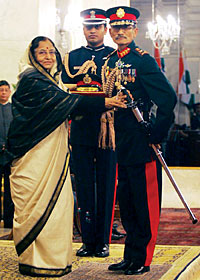 |
New Delhi - At a reception hosted by General Chhatraman Singh Gurung in the lawns of the expansive Nepal embassy grounds here on Tuesday, the who's who of the Indian defence establishment made an appearance. Indian Army chief General Deepak Kapoor; General Gurung's batch mates from the Indian Military Academy, now in the top echelons of the military; PM's special envoy Shyam Saran; defence attaches from foreign embassies; and retired and serving diplomats queued up to greet the Nepal Army chief.
The bonhomie was palpable. The old tradition of honouring the army chief of a neighbour had just been given continuity. General Kapoor's Nepal visit itself is in the pipeline. The conversation hovered around 'traditional and historic' army-to-army ties. The Indian army brass was impressed with General Gurung's 'sober and apolitical' outlook. "He is focused and knows where the army's job ends and the government's job begins. And he is a very intelligent man," said a top Indian officer. And a member of the Nepali delegation observed, "They are really giving him the royal treatment. Their support to the Nepali state and the Nepal Army has been conveyed in clear terms."
Both sides insisted that it was a conventional goodwill visit. But the underlying political message and concerns were hard to miss. There was a sense that the Nepal Army had just passed through a difficult political challenge, and may face testing times again, during which it will have India's full support.
In informal conversations, the Indian defence brass conveyed its desire to see a 'democratic, professional, and apolitical' army. The argument was that the Nepal Army is the only stable institution in the Nepali state, and the only force capable of standing up to the Maoists. Former Maoist combatants will be welcome to join as individual Nepali citizens after meeting the established criteria. But there should be no integration in a manner that would 'politicise' the army and harm its 'institutional integrity'. The Maoists were 'untrustworthy and had to compromise'. When the Maoist argument about how integration was necessary to change the army's 'feudal character' was pointed out, a top Indian general responded, "Is your present army chief a feudal? Don't fall for Maoist rhetoric."
Across the Indian establishment, there is a consensus that the Maoists intend to capture the Nepali state and establish a form of totalitarian rule. The non-Maoist Nepali political class has conveyed the same impression to Delhi. The sense is that too many concessions have been made to the Maoists in the past and this time, the 'Nepali state and the democratic political class' cannot blink in the face of Maoist aggression if they want to survive.
The bottom line is that until the Maoists reform themselves; accept multi-party democracy in principle and practice; entirely settle the PLA question and disband the YCL; return seized property; and agree to be a constructive opposition, instead of the 'irresponsible' one they have been, their participation in the government - far from leading it - is out of the question.
But there is also a recognition that this is not happening. The Maoists are seen to have upped the ante and become even more 'obstructionist'. Earlier, there was a feeling that this was meant to boost their bargaining strength. More recently, Maoist activities have given Delhi the impression that the situation may spiral out of control. The next few months are seen as crucial and if there is no broad agreement soon, Delhi believes the country may slide into a violent confrontation.
Noone here believes that the constitution will be written by May or knows with any precision what will happen after that. Any kind of presidential takeover is not a preferred outcome, for Delhi understands that it would not be a sustainable political arrangement. But if the Maoists 'push the country into conflict', then anything may happen.
India is now deeply worried about the unfolding events in Nepal. It recognises that the process it initiated may be in its death throes. But the consensus is that the onus rests entirely on the Maoists to reform, compromise, and cooperate. If that does not happen, Delhi feels Nepal will head into a 'conflict between multiparty system and one party rule, between democracy and communist dictatorship'. If that happens, India is prepared to back the Nepali state with all its might.
READ ALSO:
Friends like these - FROM ISSUE #480 (11 DEC 2009 - 17 DEC 2009)



